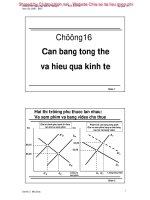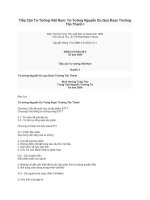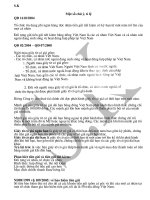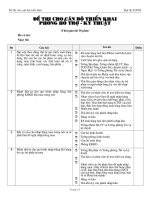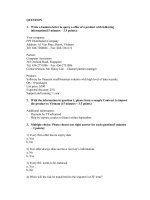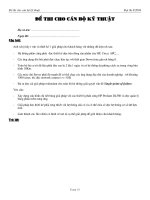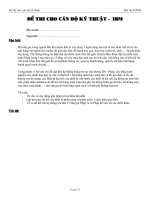can- must
Bạn đang xem bản rút gọn của tài liệu. Xem và tải ngay bản đầy đủ của tài liệu tại đây (156.92 KB, 2 trang )
[Type the document title] [Pick the date]
can 1 modal verb
1 to be able to do something or know how to do something
I can't ( = cannot ) swim!
Jean can speak French.
Even a small computer can store immense amounts of information.
Use can and be able to to say that someone has the ability to do something. Be able to is more formal
Can you speak Spanish?
He is able to see with his left eye.
Use could to say that someone has the ability to do something, but does not do it
He could be a much better player.
Could is also the past form of can. Use could or a past form of be able to to say that someone had the
ability to do something in the past
She could ride a bike when she was three.
He was able to walk with a cane.
Use will be able to to talk about future ability
People will soon be able to travel to other planets.
2 to be allowed to do something
You can go home now.
In soccer, you can't touch the ball with your hands ( = it is against the rules ) .
3 ( spoken ) used in order to ask someone to do something or give you something, or when you offer or
suggest something
Can I have a cookie?
Can I give you a hand?
4 used in order to show what is possible or likely
It can't be Steve; he's in New York right now.
I still think the problem can be solved.
5 used with the verbs “see,” “hear,” “feel,” “smell,” and “taste,” and with verbs relating to thinking, to show
that an action is happening
Nancy can't understand why I'm so upset.
I can see Ralph coming now.
6 used in order to show what often happens or how someone often behaves
It can get pretty cold here at night.
7 used in order to express surprise or anger
You can't be serious!
How can you be so stupid!
8 [ in questions and negatives ] used in order to say that you do not believe something is true or right
This can't be the right road.
It can't be easy living with him.
9 [ in questions and negatives ] used in order to say that someone should not or must not do something
You can't expect him to change.
➔ COULD
must 1 modal verb ( negative short form mustn't )
1 ( past tense had to ) used in order to say that something is necessary because of a rule, or because it is the
best thing to do
The $60 passport fee must accompany your application.
It's getting late - I really must go.
➔ see Grammar box at HAVE TO
If an action is not necessary, you can say that you don't need to do it
I don't need to leave until 10.
If someone must not do something, s/he is not allowed to do it. Must not is quite formal and is used
especially in written English
You must not take any sharp objects on the plane.
Do not say don't need to to mean must not .
1- Hanh Pham
[Type the document title] [Pick the date]
2 ( past tense must have ) used in order to say that something is very likely to be true
George must be almost 80 years old now.
We must have gone the wrong way.
3 used in order to suggest that someone do something
You must see his new film.
have to also have got to modal verb
1 to be forced to do something because someone makes you do it, or because a situation makes it
necessary
We don't have to answer their questions.
Susan hates having to get up early.
I've got to go now. I'm already late!
2 used when saying that it is important that something happens
You'll have to be nice to Aunt Lynn.
3 used when telling someone how to do something
First you have to take the wheel off.
4 used when saying that you are sure that something will happen or is true
He has to be stuck in traffic - he wouldn't be late otherwise.
GRAMMAR have to, have got to, must have to - used when a rule, law, situation, etc. forces you to do
something and you do not have a choice about it : You have to pay tax on your income ( = because the law
says it is necessary ) . | We have to be at the airport by 5:30 ( = because the plane will leave soon after that time ) .
must - used especially in more formal writing when a law or person in authority forces you to do
something : All visitors must report to reception. must - used when you make yourself do something
because you think it is a good idea or necessary : You must come to Boston! ( = because we want to see you
and we think it would be a good idea ) | I must study for tomorrow's test ( = because I know it is a good idea if I
want to do well ) . have got to - used in spoken English instead of have to or must to emphasize how
important it is to do something : I've got to be back by 8:00.
(Source: Longman Dictionary of American English)
2- Hanh Pham
